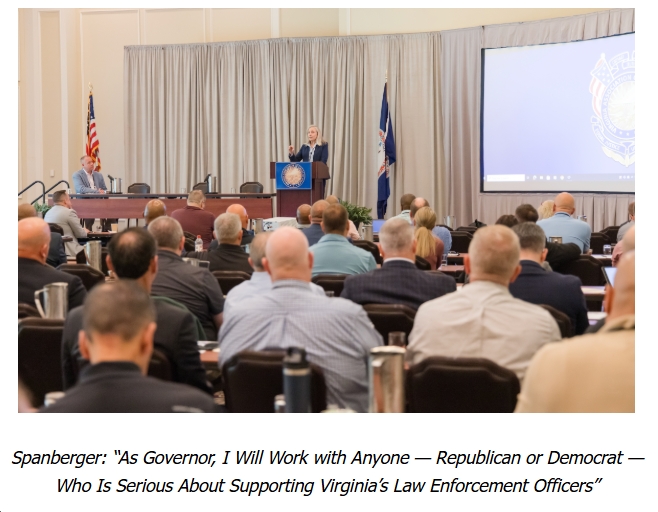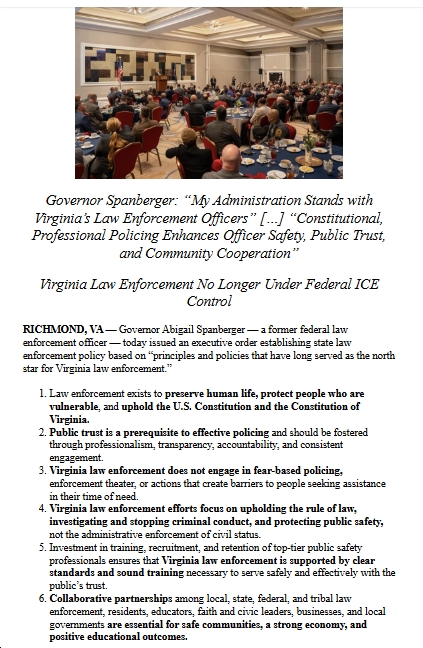From Gov. Northam’s office:
Governor Northam Announces Commitment to Oppose Additional Mandatory Minimum Sentences for Remainder of His Term
~ Governor vetoes two mandatory minimum bills in conjunction with today’s announcement ~
RICHMOND—Governor Ralph Northam today shared a commitment that no additional mandatory minimum sentence legislation will receive his signature for the remainder of his term in office. In conjunction with that commitment, Governor Northam today vetoed House Bill 2042 and Senate Bill 1675, two bills that would have added new mandatory minimum sentences to Virginia state code.
“I believe we have more than enough mandatory minimum sentences—more than 200—in Virginia state code,” Governor Northam writes in a Washington Posteditorial. “In recent weeks, I have visited with community leaders across the state seeking input on how I can best utilize the power of the governor’s office to make our Commonwealth fairer and more equitable for communities of color. My commitment today will not solve all of the issues with our criminal justice system, but I believe it is a step in the right direction.”
Governor Northam continues, “Mandatory minimums are focused on punishment, not rehabilitation…we need to focus on evidence-based approaches that ensure equitable treatment under the law.”
The full text of Governor Northam’s editorial can be found here.
Over the years, mandatory minimum legislation has increased the prison population, but data do not indicate that they increase public safety. Instead, mandatory minimum laws disproportionately harm people and communities of color, while eliminating judicial discretion to weigh the circumstances of individual cases.
The court system relies on judges and juries to make sound sentencing decisions based on the circumstances of each individual case. In making these decisions, judges and juries consider a number of factors before determining a sentence, and their sentence decisions are the result of intense deliberation. Imposing mandatory minimum sentences eliminates the discretion of judges and juries, and ties the hands of the individuals entrusted to make these important decisions. While violence is unacceptable, these are crimes that can be addressed by a judge with full knowledge of the facts and circumstances of each particular case.
The Governor’s full veto statements of House Bill 2042 and Senate Bill 1675 are below.
House Bill 2042
May 1, 2019
Pursuant to Article V, Section 6, of the Constitution of Virginia, I veto House Bill 2042. This legislation creates a 60-day mandatory minimum term of confinement for any person who commits an offense against a family or household member and has been convicted of another offense against a family or household member within the last 10 years.
We rely on our judges and juries to make sound sentencing decisions based on the circumstances of each individual case. In making these decisions, judges and juries consider a number of factors before determining a sentence, and their sentence decisions are the result of intense deliberation. Imposing mandatory minimum sentences eliminates this discretion and ties the hands of the individuals we have entrusted to make these important decisions.
Accordingly, I veto this bill.
Sincerely,
Ralph S. Northam
Senate Bill 1675
May 1, 2019
Pursuant to Article V, Section 6, of the Constitution of Virginia, I veto Senate Bill 1675, which creates a six-month mandatory minimum term of imprisonment for any person who kills or injures an animal owned, used, or trained by a law enforcement agency, regional jail, or the Department of Corrections. This legislation also requires that the mandatory minimum term be imposed separately and made to run consecutively with any other sentence.
We rely on our judges and juries to make sound sentencing decisions based on the circumstances of each individual case. In making these decisions, judges and juries consider a number of factors before determining a sentence, and their sentence decisions are the result of intense deliberation. Imposing mandatory minimum sentences eliminates this discretion and ties the hands of the individuals we have entrusted to make these important decisions.
Accordingly, I veto this bill.
Sincerely,
Ralph S. Northam


















